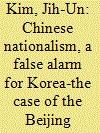|
|
|
Sort Order |
|
|
|
Items / Page
|
|
|
|
|
|
|
| Srl | Item |
| 1 |
ID:
078528


|
|
|
|
|
| Publication |
2007.
|
| Summary/Abstract |
The recent dramatic increase of North Korean refugees in South Korea (called saeteomin, new settlers) has attracted the attention of scholars as well as practitioners not only because of their impact on South Korea and its citizens but, more significantly, because of their unique experiences there. They have encountered various hardships in South Korean society, including economic difficulties, maladjustment to schools, and emotional distance or isolation. This article attempts to illuminate and analyze the status of the North Korean refugees and their perceptions and emotions with respect to South Koreans.
|
|
|
|
|
|
|
|
|
|
|
|
|
|
|
|
| 2 |
ID:
108381


|
|
|
|
|
| Publication |
2011.
|
| Summary/Abstract |
Chinese popular nationalism has been spotlighted as a source of the "China Threat" in interpreting the country's foreign policies by China scholars, especially, so-called constructivist pessimists. However, the applicability of this interpretation is quite limited when Sino-South Korea relations are examined. Though it is true that the anti-Korean sentiment of the Chinese has seriously grown in recent years, it has not affected the government's foreign policies to Korea. On the contrary, it has been played down or counter-balanced by the government, its media, and academics of China, as the period around the 2008 Beijing Olympics, when negative feelings surged, clearly illustrates. Chinese nationalism is not a threat to South Korea and cannot be generalized as a variable explaining Chinese foreign policies.
|
|
|
|
|
|
|
|
|
|
|
|
|
|
|
|
| 3 |
ID:
137184


|
|
|
|
|
| Summary/Abstract |
When North Korea conducted its third nuclear weapons test in 2013, observers commented that China's foreign policy toward North Korea was becoming tougher. That is an exaggeration. China's harsh rhetoric and concrete actions directed at North Korea following the nuclear test were short-lived and outweighed by its positive attitude and approaches to the North. Chinese leaders accentuated the mutual comradeship between China and North Korea, the Chinese public remained favorable to the North, and bilateral transactions continued. China has not changed its basic policy toward North Korea and is unlikely to do so in the near future.
|
|
|
|
|
|
|
|
|
|
|
|
|
|
|
|
| 4 |
ID:
156251


|
|
|
|
|
| Summary/Abstract |
After North Korea conducted its fourth nuclear test in January 2016, China’s response was stern enough for certain China analysts to posit that the Middle Kingdom’s approach to its Cold War ally was changing. In reality, however, China’s imports from North Korea, especially coal, a crucial mineral for the North’s income but banned by United Nations (UN) Resolution 2270, did not decrease. Politically, China also strived to maintain mutual relations with North Korea. Based on its strategic and other cost-benefit calculations, Beijing needs to maintain economic and political ties with Pyongyang and thus has no incentive to seriously observe the U.N. resolution. In this context, China is expected to virtually repeat the gestures it made in the past in dealing with the North. Under these circumstances, sanctioning North Korea through China is not considered a viable option in tackling the nuclear issue; rather, the USA and South Korea should change their policy approach toward this problem.
|
|
|
|
|
|
|
|
|
|
|
|
|
|
|
|
|
|
|
|
|